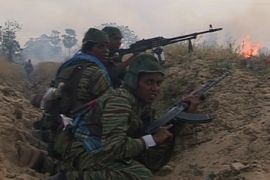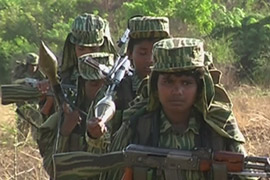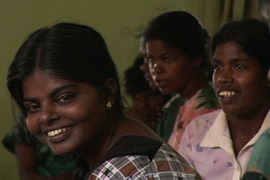Sri Lanka’s female Tigers
Woman fighters willing to die for their cause battle the military on the frontlines.

 |
| Training is intense and diverse, from military to history to technology |
The Tamil Tigers’ female fighting force has developed a reputation for their focus and determination.
| IN VIDEO | ||
|
Their all-female combat units are currently fighting on the frontline as the Sri Lankan military prepares for what it says could be its final offensive in the north of the country.
Most of the girls are prepared to fight to the death to defend what they say is their rightful homeland in the north and east of Sri Lanka.
But President Mahinda Rajapaksa’s government is equally determined to finish the civil war and finish off the Liberation Tamil Tigers of Elam (LTTE).
 |
| Women fight alongside men as the LTTE has mobilised all its troops for the frontline |
Visiting the LTTE’s modern and airy “peace secretariat”, female Tigers were seen busily updating the group’s websites on the latest Apple computers.
The girls wear their hair in plaits or short, and don green military fatigues on the battlefield. Off the field, they wear black cargo pants with white or chequered shirts.
They are guarded and pepper conversations with references to their “enemy”, the Sri Lankan military.
Most of the girls speak English.
Their training is intense. Apart from military training they are also taught about the history of the Tamil people, the LTTE’s battles and “martyrs”, and given computer lessons.
| Profile of a female Tamil Tiger |
|
“The hardest part of working on the frontline is facing the shelling.
“I have killed before. I feel satisfied when I have killed the enemy.
“I think the international community needs to understand the difference between freedom fighters and terrorists.
“We are freedom fighters struggling for our homeland.”
Off the battlefield, a softer side of Malathy comes through.
“It is women and children that are affected the most in war that is why women make better soldiers.
Myself, I will think about becoming a mother after the struggle is over and we have our homeland.”
Malathy has not seen her own parents for a while. They live in Jaffna in the north.
The area is currently controlled by the Sri Lankan army and cut off from Kilinochchi by a series of checkpoints.
I offer to take them a letter from her. But she says I would have difficulty finding them as they are internally displaced people.
For Malathy the LTTE’s elusive leader Velupillai Prabhakaran is her new family.
“He is commander, leader, mother, father, everything to me,” she says.
I wonder how much of Malathy’s apparent dedication has been forced upon her and whether she would she give up her life for the struggle as a suicide bomber with the LTTE’s infamous Black Tigers.
“Yes if the leader permits me, yes I would,” she says. |
But school is out at the moment because the LTTE needs all its soldiers on the frontline.
Driving through the Tigers de-facto capital, it is obvious the city is in decline.
The school and various buildings still carry the scars of attacks by the Sri Lankan military.
Day and night the thud of shelling can be heard as the Sri Lankan military targets the last LTTE positions, and the economic embargo on fuel and other necessities has seen many prices double in the past year.
The closure of the A9 highway last August by the Sri Lankan government cut off most of the north of the country from Kilinochchi, separating families overnight.
But the LTTE has absolute power in its bastion, running courts, police stations and their own administration.
Leaders are said to eliminate opposition swiftly, making it hard to gauge the civilian population’s real opinion of the movement.
Voluntarily or coerced, many Tamil families in the north and east will give up one of their children to join what the LTTE calls “the struggle”.
However, it is allegations of child recruitment and their suicide bombing tactics that has put the LTTE on the list of terrorist organisation in 33 countries, including in the EU, US, Britain, Canada and Australia.
But the LTTE’s elusive leader, Velupillai Prabhakaran, still appears to command total support from his female commanders, including the head of the LTTE’s female political wing S Thamilini, who says the international community has got it wrong.
“We are fighting against state terrorism – the Sri Lankan army.
 |
| The Tamil Tigers say they are fighting “state terrorism” |
“The international community should understand the difference between the freedom struggle and terrorism.
“We are not terrorists we are freedom fighters. Our targets are not civilians,” she says.
Thamilini would not reveal how many female soldiers the LTTE had but said they had no problem recruiting girls or getting funding.
“We are spread all over the world. The Tamil people have a lot of brain power.
“The Tamil diaspora continues to give their support. Not just money – moral support.”
But Tamil civilians are the real casualties of the 24-year-old civil war.
At Kilinochchi’s Victory House, a refuge for women mentally affected by the conflict, there were more than 100 women.
The refuge is clean but spartan and the women are heavily sedated.
 |
| Victory House is a refuge to at least 100 women mentally affected by the conflict |
Some of them say they have been separated from family members, or no longer have a home to go to.
Others claim to have been raped by the Sri Lankan army or have fled the shelling.
In the past year, the number of patients has increased dramatically.
Jekatha, a bright 21-year old, said she was separated from her family when the Sri Lankan military took control of Jaffna in the north.
“When can you give us peace?” she asks.
But with no shortage of female Tigers prepared to die for their struggle and the Sri Lankan military preparing a full scale campaign in the north, peace seems further away than ever.

